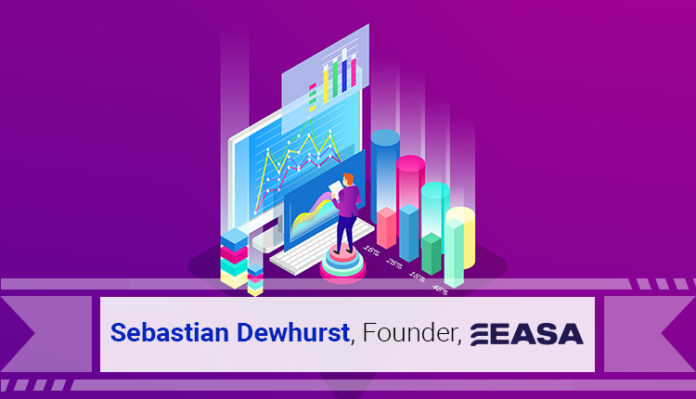Sebastian Dewhurst
By: Sebastian Dewhurst, Founder at EASA Software
AI and Accountancy
“For decades, spreadsheets have been essential to the accounting world because of their flexibility, familiarity and how deeply involved they are when it comes to daily workflows. To this day, Microsoft Excel still retains bragging rights as the number one platform of choice1 when it comes to financial modelling, forecasting and reporting across businesses of all sizes. But whilst these tools remain flexible and familiar, the downside is that they are becoming increasingly unfit for a world that demands pace, structure and smart automation.
The growing tussle between innovation and tradition will define the future of accounting. Despite 80% of businesses relying on Excel for essential processes, dated spreadsheets represent a critical bottleneck in the race towards finance functions that integrate AI seamlessly. To bridge the divide, businesses must reevaluate their methods of utilising spreadsheets to create secure and scalable tools that can support the future of AI-driven finance.”
How AI is Affecting The Reign Of The Spreadsheet
“Spreadsheets have served as all-encompassing tools for daily tasks like financial modelling and forecasting. But as companies are growing and their workflows are becoming more complex, these traditional spreadsheet models are becoming harder to scale, audit or integrate with modern data infrastructure.
Some spreadsheets lack formal organisation, containing inconsistent data entry formats, hidden formulas and manual overrides. Usually, there is a lack of documentation which explains how calculations are performed or what assumptions are integrated within the model. There is very little version control, and the files tend to be siloed on email threads or individual computers.
AI and machine learning systems rely on structured and high-quality data to function effectively, as well as a plethora of functions such as well-defined inputs and outputs, consistent formatting, clear documentation, and reliable access to the underlying logic. The problem here is that spreadsheets very rarely match up to these standards.
The lack of organisation makes it hard for AI-based tools to connect with spreadsheets. As a result, finance departments end up spending more time cleaning up data and reformatting inputs as opposed to reaping the benefits of automation. Furthermore, the vague nature of spreadsheets poses various risks when it comes to compliance, governance and auditability, factors which are all vital in the regulated world of accounting.”
Read More: Global Fintech Interview with Slava Akulov, CEO & Co-Founder at Jupid Tax
The AI Storm Threatening Accountancy
“The risks associated with companies continuing to use outdated spreadsheet models are incredibly high. Without structure and oversight, models become outdated, errors go unnoticed and institutional knowledge is lost when core employees leave. One of the biggest concerns for companies is data privacy and intellectual property (IP) protection. When proprietary models and sensitive financial data are introduced into external AI tools, the risk that this data could be exposed or shared with third parties is extremely high.
When spreadsheets that contain sensitive business data are left unprotected, they become a vulnerability instead of an asset which then, in turn, becomes a major barrier to AI adoption. If organisations cannot control what data AI has access to, they risk compromising their internal processes and competitive edge.”
Solving The AI Integration Puzzle
“Instead of companies abandoning their spreadsheet models as a whole, a more practical solution to this is by modernising them. By updating their software, finance departments can transform traditional spreadsheet models into structured, controlled and web-accessible applications. Companies can also retain institutional knowledge embedded in their existing tools while getting rid of the restrictions that currently prevent AI integration.
This includes involving spreadsheet logic within a web-based interface that carries out consistent input and output formats, automates validation, and manages access through user permissions. These web applications reflect the original functionality of the spreadsheet but the difference is that more layers of control, documentation and security are added, which are all essential for company use
More importantly, this strategic approach enables a flawless interaction with AI-based tools. These web-based applications can get rid of the complications that accompany spreadsheet use by applying structured data, standardised formats, and transparent workflows. These factors create a setting where AI can be effectively used without manual intervention.”
A Secure Financial Future
“Without a doubt, AI is transforming the face of accounting as we know it; however, the industry’s heavy reliance on spreadsheets, as it is, is becoming a liability. Rather than leaving spreadsheets behind, organisations should start to see them as a starting point that can be evolved with the right tools.
By transforming traditional spreadsheet models into secure and structured web applications, companies will be empowered to modernise their workflows without disruption and will lead to a favourable outcome that includes a secure and scalable finance function that is AI-ready.”
References:
1
2
Read More: The End of AI’s Wild West: How New Regulations Will Reshape Financial Services in 2025
[To share your insights with us, please write to psen@itechseries.com ]
